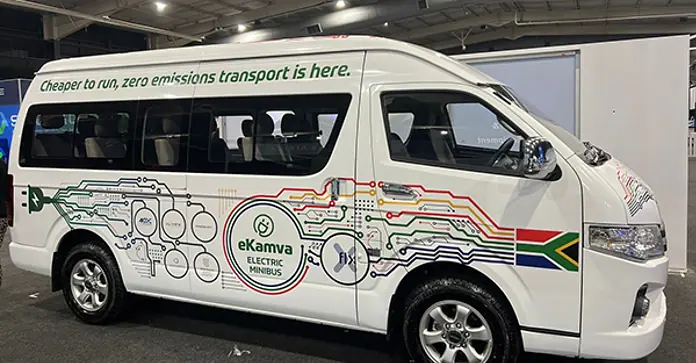Electric minibus taxi eKamva launched with flx EV business model and app for South African market
SOUTH Africa’s first electric minibus taxi model, eKamva, was launched by a consortium led by GoMetro, alongside an integrated new electric vehicle (EV) business model and charging infrastructure product called flx EV at the Smarter Mobility Africa summit.
eKamva was launched by a partnership of companies and research institutions, led by GoMetro, a transport technology platform.
The partnership kicked off in 2023 to investigate and advance the feasibility of an electric minibus taxi in South African conditions by testing production vehicles in South Africa.
The project team, consisting of GoMetro, Powerfleet (formerly MiX Telematics), HSW, ACDC Dynamics, and various entities within Stellenbosch University’s Faculty of Engineering, conducted rigorous and extensive testing in and around the town of Stellenbosch on existing taxi routes, using traditional minibus taxis.
The typical South African commuter already spends up to 40% of their income on transport. At the same time, the minibus taxi sector is still struggling from the impact of the pandemic and ride-share apps on their operations.
Minibus taxis transport millions of people in Southern Africa daily, contribute an estimated 30 million tons of carbon dioxide in South Africa alone, and consume two billion tons of fuel a year.
The flx EV website will soon allow minibus taxi owners and operators to apply to be added to the waiting list for the solution. The flx EV app will let taxi owners manage their fleets, see each vehicle’s status and prepay for recharging, while drivers will be directed to their closest charging hub. GoMetro CEO Justin Coetzee says, “This is a new approach to electrifying the smaller-vehicle public transport industry. We believe it will spark an entirely new economic sector and is socio-economically very important for the automotive sector.”
Historical data gathered by GoMetro indicates that replacing urban taxi and shuttle fleets with eKamvas will reduce carbon dioxide emissions by 13,7 tons per vehicle per annum, says project lead Rudi Kriel.
“Most taxis spend up to three hours a day between morning and evening peak hours at the ranks we have analysed, more than sufficient time to fast-charge an eKwamva,” Kriel says.
“EVs have fewer breakdowns than internal combustion vehicles, and are cheaper to run, which leads to increased profitability per vehicle – and they have a longer life expectancy,” he continues.
The 15-seater eKamva has a range of more than 200 km between charges, fast-charges within 75 minutes via a 60kW DC charger and slow-charges overnight for 10 hours. It delivers an estimated 40-70% cost savings over traditional vehicles on running costs, depending on the fuel price (inland vs coastal) and distance of the taxi route in question.
EVs are considered a silver bullet to globally decarbonise the transport sector. The development of low-carbon transport in cities is part of the global agenda to delay climate change and relates to many of the United Nations’ Sustainable Development Goals. While EV sales have increased substantially in the Global North and many international vehicle manufacturers plan to stop production of combustion engines as early as 2030, in sub-Saharan Africa, the transition to EVs continues to be painstakingly slow.
